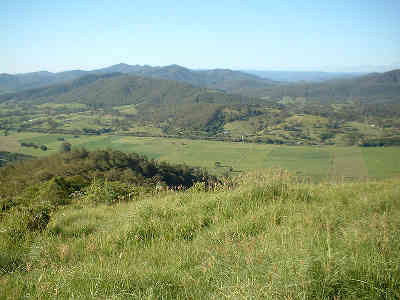|
Why
is "Grass-fed" better?
All red meat
is a valuable source of nutrients, protein and energy and studies
show that eating 71 grams (cooked weight) per day protects against
heart disease. Grass-fed
red meat offers so much more. Grass-fed meats
come with a rich assortment of health, environmental, social and
economic benefits:
Health
Benefits:
This
section is under review.
Environmental
Benefits:
Pasturing
animals encourages biodiversity, improves soil fertility and eliminates
the waste-management problems associated with feed-lot operations. Feeding animals on grass reduces greenhouse gases in the
air due to a process called carbon sequestration, wherein the
grasses and legumes found in well-managed pastures are able to
draw excess carbon dioxide from the air and return it to the soil
as carbon.
Buying
pasture-raised products helps to keep a farmer in business. Thus the land remains as farm-land instead of being sold
to become another subdivision, shopping mall or parking lot. If you live in an area that is rapidly losing open space
consider that there are fewer better uses of wide-open spaces
than a small-scale family farm. They enhance the landscape, provide a local
food source and make good use of the land they occupy.
Social
Benefits:
Purchasing
grass-fed meat has a dramatic impact on animal as well as human
welfare. Animals raised on lush, green pasture experience
significantly less stress over the course of their lives than
their feed-lot raised counterparts. Our animals are not overcrowded, are able to get exercise
and can act on their natural instincts such as moving to the shade
in the heat of the day, eating when hungry, or even playing with
each other. Because they
are moved onto a new paddock daily they enjoy clean and spacious
environments and are much less likely to contract an array of
diseases. The farmers working
on grass-based operations also have a healthier work environment
than those who work in confinement facilities.
Economic
Benefits:
Although
grass-based farms are more labour intensive, farm inputs such
as fossil fuels, are kept to a minimum, thus significantly reducing
farmers' expenses. Furthermore farmers are able to get a fair price
for their product when they sell to informed, socially responsible
consumers who are willing to pay the true cost of their food. This means that farm families can enjoy a fair
return for their labour. Small-scale
family farms - as most pasture-based farms are - that are locally
owned and operated contribute in numerous ways to a community. They hire local workers and contractors, purchase
local goods and participate in local activities.
Your
decision to purchase grass-fed beef is an important one. It helps heal our environment, ensures the welfare of the
livestock and enables farmers to realize better working conditions
and a fair income.
But
the benefits don't stop there. Grass-fed meat also tastes better!!
Cooking Tips
As
there is less fat in grass-fed beef, it changes the way the meat
cooks. There are four basic principles for cooking
grass-fed meat:
- Put away your timer - get a good meat thermometer.
- Turn down the heat.
- Learn when to use dry-heat or moist-heat cooking methods
- Ease up on seasonings and sauces.
Hayes'
cookbook (listed below) is an excellent guide.
BON APPÉTIT!
Sources:
- Shannon Hayes' "The Grass-fed gourmet cookbook" pp:3,4
Pub: Eating Fresh Publications 2004 (www.eatingfresh.com)
- Jo
Robinson's "Pasture Perfect: The Far-Reaching Benefits of Choosing Meat, Eggs and Dairy Products from Grass-fed animals"
Pub: Eatwild, 2004 (www.eatwild.com)
|

